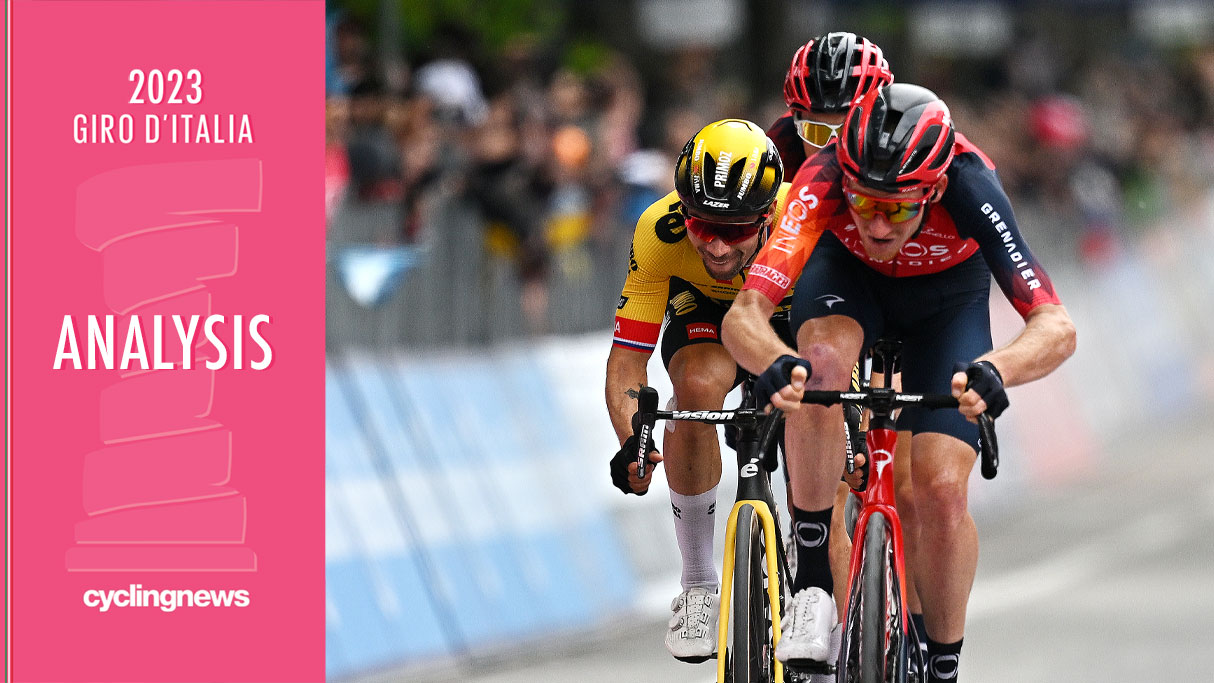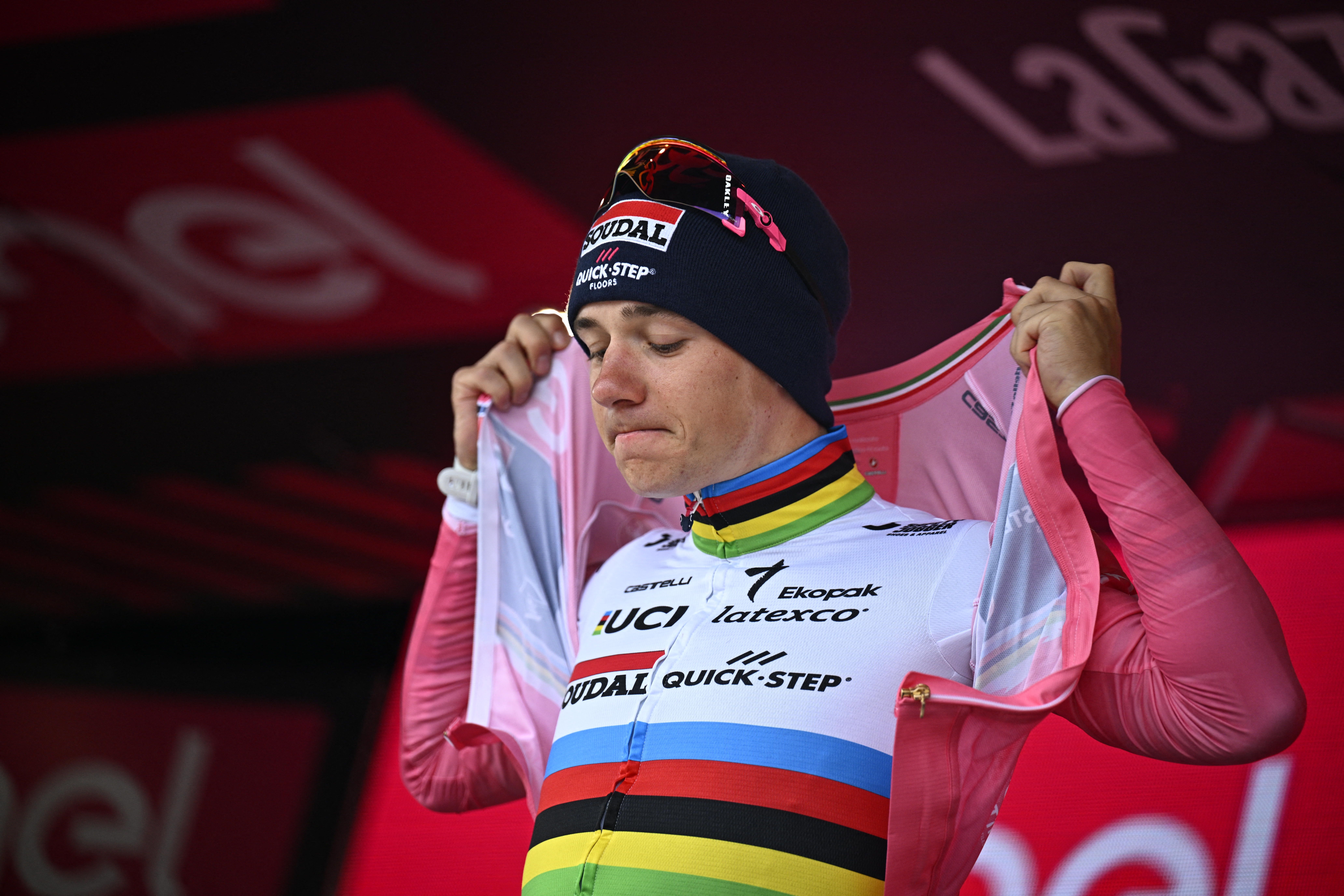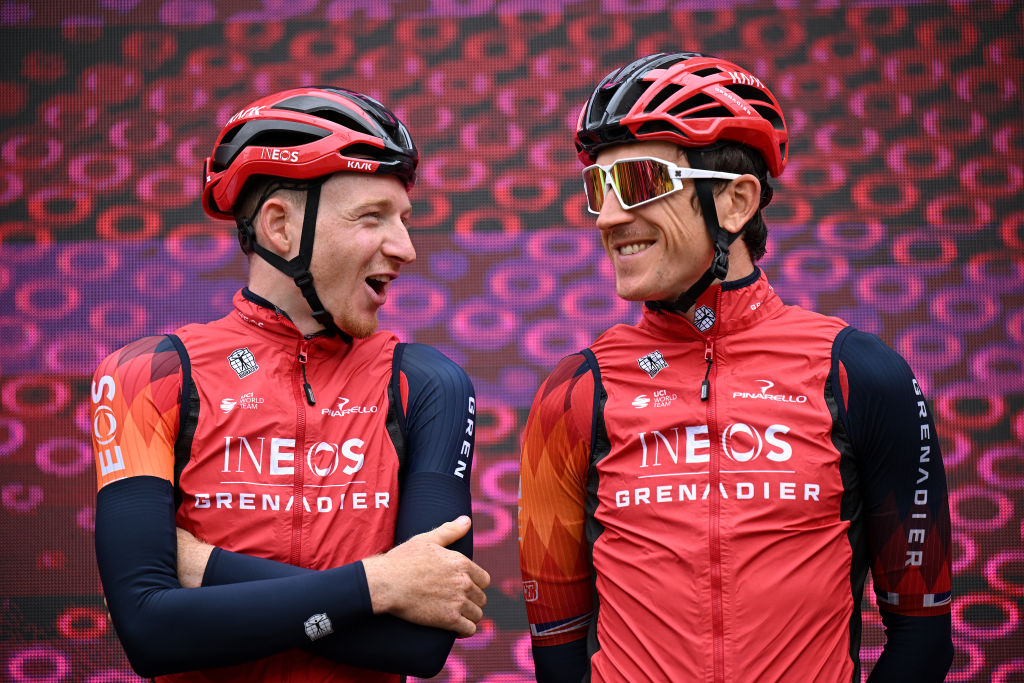Philippa York analysis: Expect a very different Giro d'Italia without Evenepoel
Geoghegan Hart in ideal situation as Thomas takes on pink jersey duties

It was no surprise when Remco Evenepoel claimed the maglia rosa after stage 1 of the Giro d’Italia, even if we all thought Filippo Ganna would rival the world champion more closely. He couldn’t match him. Nobody could. Evenepoel seemed unbeatable.
Yet a week is a long time at the Giro d'Italia, more so than in any other Grand Tour.
Even before the news of his COVID-19 positive broke on Sunday evening, nobody was talking about Evenepoel dominating the race anymore after his narrow win in the stage 9 time trial. The plan that had been so successful for the Soudal-QuickStep leader in most stage races – win the time trials, follow on the climbs – was looking a bit shaky to say the least.
It was all going so perfectly for a while, even to the point of looking like a foregone conclusion, but then dogs, desperados and damage showed a few chinks in Evenepoel's amour.
There is no race like the Giro d'Italia for drama and uncertainty.
Coming into the Giro, Evenepoel and his team must have been aware that this opening phase would see him ride more consecutive race days - nine - than he had ever done before and he would have trained accordingly, but they couldn’t have imagined that he’d also have crashed twice. That’s not something anyone practices.
Not even Evenepoel’s strength could save him from the randomness of first week luck, which all riders encounter at one time or another.
Get The Leadout Newsletter
The latest race content, interviews, features, reviews and expert buying guides, direct to your inbox!
On Saturday, you wondered if it had caught up with him. But now, all conjecture about the reasons for his weekend performances is moot. COVID-19 is back in the peloton and has claimed another casualty. Evenepoel has gone home.
Geoghegan Hart the happiest

We can expect a very different race now that one of the main favourites is out, especially as the other, Primož Roglič, has had his own setbacks too.
Ineos Grenadiers have the strongest collective, as we’ve seen when the road rises, but with Evenepoel gone, their race changes from one of looking for opportunities to suddenly having to adopt much more responsibility.
Being the new race leader has its good and bad points for Geraint Thomas, though personally I think the happiest person on the team will be Tao Geoghegan Hart. No media requirements, no podium visits unless he wins, way less pressure, and less interest in how he’s feeling or what he is thinking. It’s all going to add up to more recovery time and energy for the feared final week of high mountains, and up until now he has been the team’s best climber.
Jumbo-Visma had to have been worried by Roglič losing over two seconds per kilometre to Evenepoel during the first time trial and then reassured that he was back on track for the last two stages.
Being within a minute of Evenepoel was probably their expectation at this point, but now they’ll look at Ineos and company with much more optimism. If the stage 8 attack was anything to go by, then they have to be thinking that things are only going to get much more interesting from now on.

Finding inspiration from the attacks, pity the pure sprinters
The real tactical plays have to come from guys like João Almeida, Lennard Kämna, Aleksandr Vlasov or Damiano Caruso. They’ve been thereabouts so far, limiting their loses and, in the case of the Bora duo, not afraid to provoke a reaction from the GC contenders to measure where everyone is.
Jay Vine and Hugh Carthy haven’t quite been fully present yet, but the terrain and weather haven’t been favourable to their strengths either.
The latter has to be inspired by the performance of Ben Healy and it’s not out of the realms of possibilities that another long-range escape goes to the finish and there’s a change in the GC fight. Soudal-Quickstep did that to perfection when they allowed the right combination of riders go on stage 4 and DSM seized the opportunity with Andreas Leknessund.
The resurrection of Thibaut Pinot leading the mountains classification was promising while it lasted but he is reportedly ill and the French will be watching Aurélien Paret-Peintre with special interest now.
The most contested classification so far, the points jersey, has seen Trek-Segafredo, Jayco AlUla and Alpecin-Deceuninck employ some curious tactics with moments when they ought to have collaborated with each other not happening.
It’s clear Mads Pedersen wants the maglia ciclamino at the end of the race and now that he’s won his stage a certain amount of pressure is off them – but they were lucky that the little portion of pave 1300m from the Naples finish line broke Simon Clarke and Alessandro De Marchi’s legs completely. Otherwise, that was another breakaway success, which is something not usually seen in the first week of modern Grand Tours.
There’s been a lot of desperation in the sprints so far, with the Mark Cavendish wipe-out by Alberto Dainese the perfect example of the behaviours that cause so much anxiety for the GC teams.
It ought to calm down from now on, although with Ineos leading, they won’t want to be exposed to Roglič taking bonus seconds. That means the crazy starts will probably continue, beginning on stage 10 on Tuesday over the Apennines to Viareggio. It'll be fascinating to see if Ineos work to defend the maglia rosa for longer than a day or try to 'give' it away until the stage 13 mountain stage to Crans Montana or even the third week.
And the other development to look forward to, of course, is this: will Remco Evenepoel now ride at the Tour de France?
Philippa York is a long-standing Cyclingnews contributor, providing expert racing analysis. As one of the early British racers to take the plunge and relocate to France with the famed ACBB club in the 1980's, she was the inspiration for a generation of racing cyclists – and cycling fans – from the UK.
The Glaswegian gained a contract with Peugeot in 1980, making her Tour de France debut in 1983 and taking a solo win in Bagnères-de-Luchon in the Pyrenees, the mountain range which would prove a happy hunting ground throughout her Tour career.
The following year's race would prove to be one of her finest seasons, becoming the first rider from the UK to win the polka dot jersey at the Tour, whilst also becoming Britain's highest-ever placed GC finisher with 4th spot.
She finished runner-up at the Vuelta a España in 1985 and 1986, to Pedro Delgado and Álvaro Pino respectively, and at the Giro d'Italia in 1987. Stage race victories include the Volta a Catalunya (1985), Tour of Britain (1989) and Critérium du Dauphiné Libéré (1990). York retired from professional cycling as reigning British champion following the collapse of Le Groupement in 1995.
